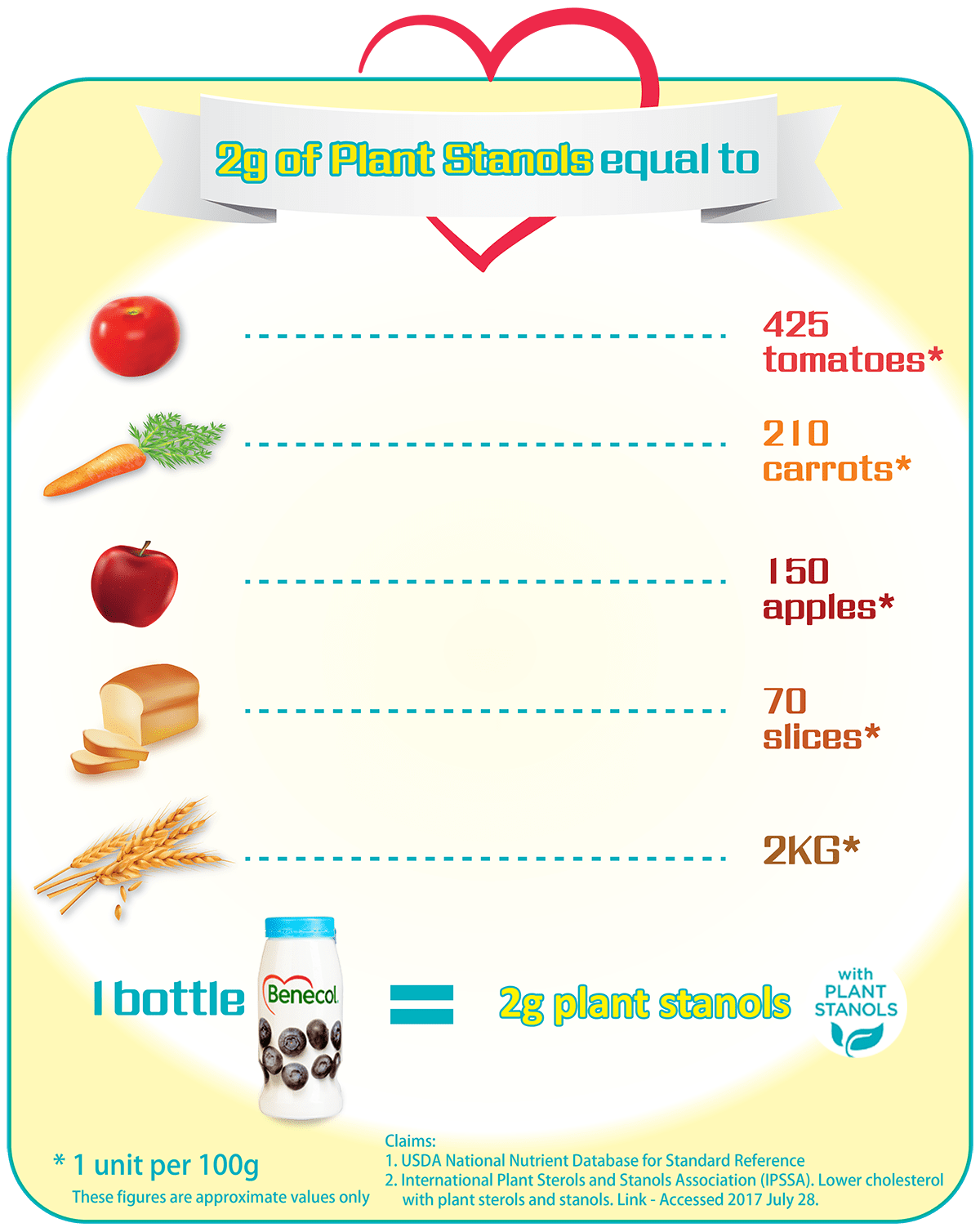What is Plant Stanols (Phytosterols)?
Understanding Plant Stanols (Phytosterols)The Plant Stanol Ester ingredient is made from Plant Stanols and vegetable oil. Plant Stanols occur naturally in certain foods, such as edible plants, seeds and grains, but the levels we get from our normal daily diet are too low to be effective for lowering cholesterol. By the end of the 1980s, scientists at Raisio, a Finnish food company, discovered a way of concentrating them and creating an ingredient called Plant Stanol Ester that can be added easily to a wide range of delicious food products. Organizations around the world such as the European Society of Cardiology, and American Heart Association have proven the cholesterol-lowering effects of Plant Stanols as well as their safety1-3. According to the European Union Register of Nutrient and Health Claims, if individuals were to consume 1.5-2.4 grams of Plant Stanols daily for a continuous duration of 2-3 weeks, their LDL cholesterol levels could decrease by 7-10%3.
Natural and EffectivePlant Stanols was one of the first functional ingredients to get a coveted health claim in Europe. This means that we can mention reduction of a risk factor in the development of disease for those using our products that include Plant Stanols. The approved claim makes Benecol® one of the most trusted products for people who want to lower their cholesterol. Safety is also assured.
|

Getting Plant Stanols (Phytosterols) in your diet
The Plant Stanol Ester ingredient is made from Plant Stanols (Phytosterols) and vegetable oil and has significant health benefits when it comes to lowering cholesterol. It occurs naturally in certain foods, such as edible plants, seeds and grains, but the levels we get from our normal daily diet are too low to be effective for lowering cholesterol. How does Plant Stanol Ester work, and what are the benefits of it?Plant Stanols have a structure very similar to that of cholesterol that means they can inhibit the absorption of both dietary cholesterol and the cholesterol incorporated into bile salts by the liver. The major benefit of plant stanols is that they are poorly absorbed from the gut and are capable of significantly reducing the amount of cholesterol absorbed. This ultimately leads to lower blood total and LDL cholesterol concentrations. Prior to being absorbed, cholesterol is first incorporated into a mixed micelle (the transportation vehicle for cholesterol absorption) in the upper part of the small intestine. Research findings suggest that Plant Stanols competes with cholesterol for space in the micelle and that this results in much less of the harmful cholesterol reaching the blood supply, passing unabsorbed into the large bowel. Furthermore, adding Plant Stanols into your diet can help lower total and LDL cholesterol without affecting HDL, and therefore has the benefit of lowering cholesterol. It has been clinically proven that consuming 2g of plant stanols in your daily diet has marked benefits. After including them in your diet for 2-3 weeks, your cholesterol could be lowered up to 7-10%*. Each bottle of Benecol yogurt drink contains 2g of plant stanol esters. You can take Benecol yogurt drinks as part of your daily diet or have it with a meal. It is also suggested to be taken alongside a balanced diet and regular exercise routine to maximize the cholesterol-lowering effect and benefit of plant stanols. To learn more about Benecol and get answers to frequently asked questions, read more here.
|
Mechanism of Plant Stanols

Benecol® is recommended and safe
Plant stanol ester has gone through extensive testing to prove its efficacy and safety. This has resulted in endorsements from many food safety authorities around the world including Europe, the US, Japan, China, Australia and Russia. Plant stanol ester has been awarded an Approved Health Claim, by the European Parliament and Generally Recognized as Safe (GRAS) status in the USA. In addition, Benecol® products have been on the market since 1995 with no reports of adverse effects. Many national health organizations now recommend that consumers include 2 g of plant stanols per day in their diets for cholesterol reduction. British Nutrition Foundation - The evidence for the cholesterol lowering effects of Plant Stanol Esters |
Claims approved by national bodies
| National Body | Year |
|---|---|---|
| US Food and Drug Administration (FDA) | September 2000 & February 2003 |
| Netherlands Nutrition Centre | Jan 2001 |
| Ministry of Health, Labor and Welfare, Japan | February 2002 |
| Swedish Nutrition Foundation | December 2006 |
International and national guidelines recommending the use of plant stanol ester for reducing LDL-cholesterol:
| National Body | Year |
|---|---|---|
| American Diabetes Association | 2016, 2013 |
| American College of Cardiology | 2016 |
| European Atherosclerosis Society | 2014-2016 |
| National Lipid Association | 2015 |
| Joint British Societies | 2014 |
| International Atherosclerosis Society | 2013 |
| European Society of Cardiology | 2012 |
| National Heart, Lung, and Blood Institute & National Institutes of Health & American Academy of Pediatrics | 2011 |
| European Society of Cardiology & European Atherosclerosis Society | 2011 |
| The Australian Heart Foundation | 2009 |
| American Academy of Pediatrics | 2008 |
| American Diabetes Association - with additional research | 2008 |
| American College of Cardiology Foundation | 2008 |
| Australian Heart Foundation | 2007 |
| American Heart Association / American College of Cardiology | 2006 |
| Joint British Societies | 2005 |
| International Atherosclerosis Society | 2003 |
| World Health Organization | 2003 |
| Food and Agriculture Organization of the United Nations | 2003 |
| International Lipid Information Bureau | 2003 |
| Joint European Societies | 2003 |
| European Union Scientific Committee on Foods | 2002 |
| National Cholesterol Education Program (NCEP) | 2002 |
| National Cholesterol Education Programme Adult Treatment Panel III, USA | 2002 |
| Finnish Internal Medicine Society | 1996 |
